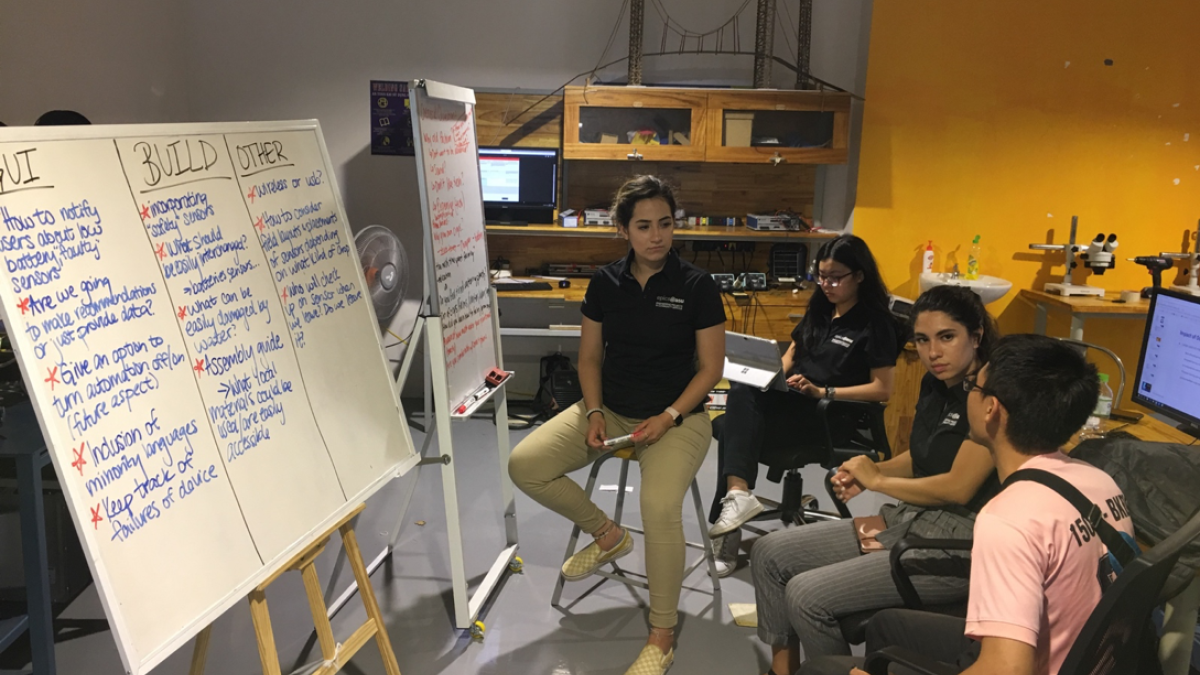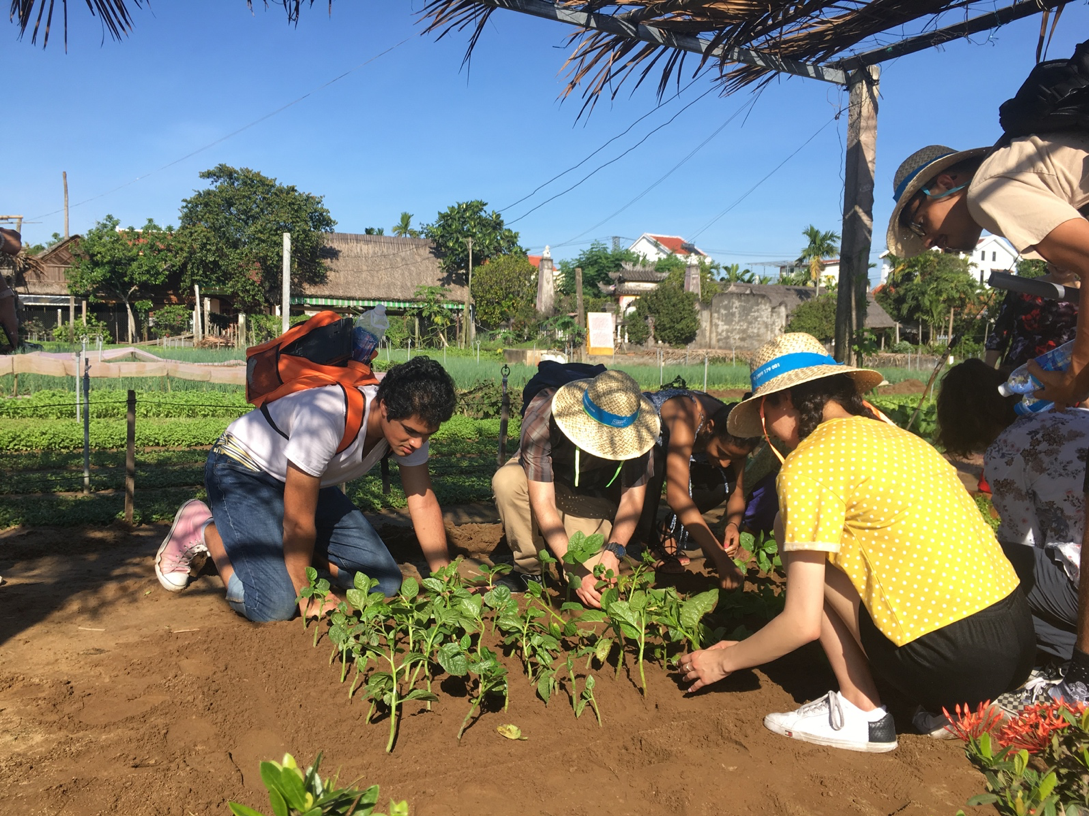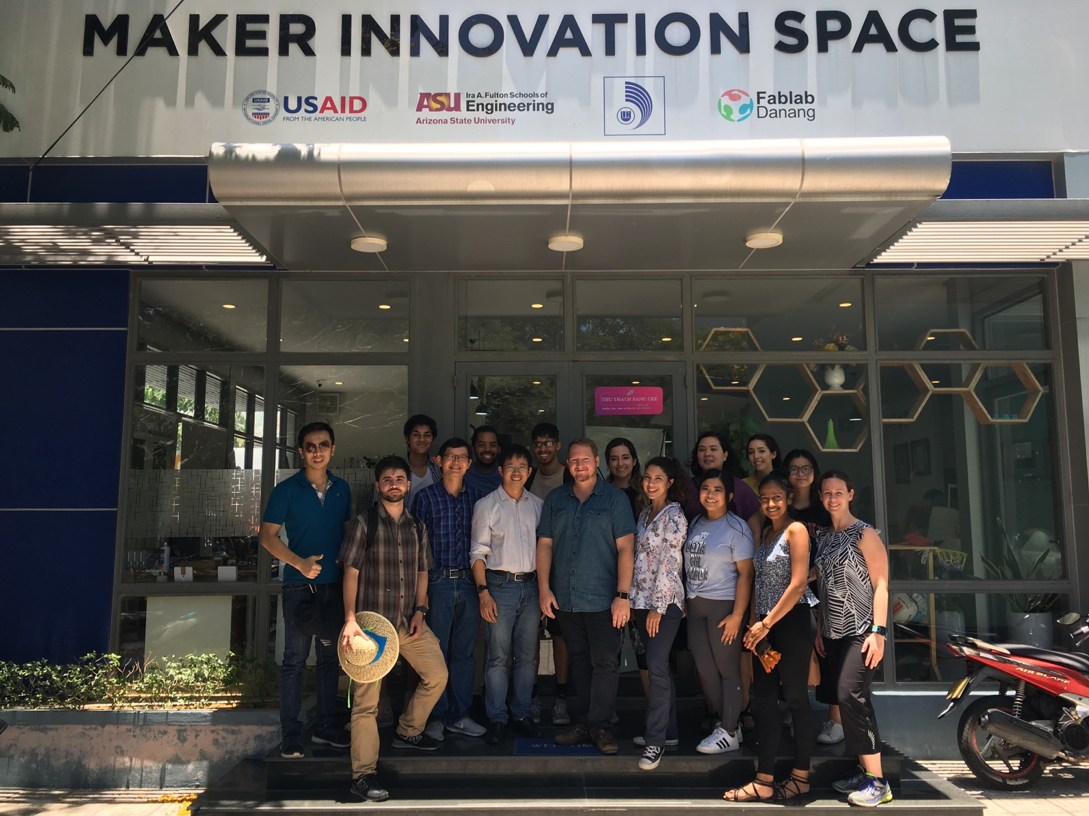Service-learning program has ASU and Vietnamese students co-develop smart farm technology

The Global EPICS team works on incorporating local experts´ feedback into sensor design at the ASU-supported Maker Innovation Space in Da Nang, Vietnam.
Engineering students: Is your dream for after graduation to use your know-how to solve global issues with opportunities like Engineers Without Borders or Habitat for Humanity?
With Global EPICS Engineering Projects in Community Service, an engineering-based study abroad opportunity, you don’t have to wait to get out there.
In May 2019, in Da Nang, Vietnam, 11 engineering students joined the launch of Global EPICS to collaborate with Vietnamese engineering students and Tra Que Vegetable Village, a sustainable farming organization, to co-develop an environmental sensor platform that includes a soil humidity sensor that provides local farmers with additional data to make important decisions about their crops. Coordinated with the ASU Study Abroad Office, students participated in the Global Intensive ExperienceSeven to 12 day credit-bearing programs led by ASU faculty members. Offered during academic breaks (spring break, winter break and before/after spring and fall semesters). program called Projects in Human-Centered Design. Once put into practice, this collaborative innovation will increase agricultural efficiency and promote sustainable farming through locally-conceptualized smart-farming technology.
Preparation is critical for any international project to be successful. Throughout the spring semester, the Global EPICS team worked remotely with Vietnamese students and faculty to identify water management as their challenge for student-led innovation and sketched out a basic concept for the humidity sensor and platform. Once on the ground in Vietnam, the team kicked off their week with an international design review led by Vietnamese academics and industry stakeholders. Then the team worked long days at the ASU-supported Maker Innovation Space in Da Nang to incorporate the local feedback into their design, build a prototype sensor and test it live.
The intensive week culminated with a test at the Tra Que Vegetable Village. By testing their sensor in Vietnam, the team gathered vital local feedback for further development during the fall 2019 semester.
“Perseverance is key. This project was a huge learning curve for a lot of us, but it was amazing to see us all persevere and step up to the plate, whether it was learning a new programming language or new computer program or working with new devices," said Karryn Baca, an aerospace engineering junior. "It goes to show that despite any difficulty or delay, with perseverance, we were able to accomplish the main goal we were working towards.”
Tommy Montero, an aerospace engineering junior, was grateful for the week of real-world engineering: “Working with the Vietnamese students is extremely helpful, especially when working with their equipment in the makerspace. The real world is different than theoretical and lab, so sometimes things that should work don’t and sometimes the solutions don’t seem logical at first.”
Global EPICS team conducts a live test at the Tra Que Vegetable Village.
The real world appplication aspect also was important to Merin Jacob, a computer science junior.
“The value received from implementing the project in Vietnam is invaluable, it not only connected our designs to the material landscape but also with the people that will be interacting with the device every day," Jacob said. "It allowed us to get a sense of the necessity for agricultural innovations required in this era to maintain diminishing food sources and water scarcity. My biggest takeaway was that more goes into a project than mechanics and engineering, it also includes real people whose opinions should not be overlooked.”
Global EPICS exemplifies ASU’s mission to offer students real-world community service projects that collaboratively build a better world. As engineering careers are ever more globally integrated, lived experiences collaborating outside students' time zones and comfort zones are critical to developing a their confidence and capacity to build working teams and solutions within our global communities.
Joshua Loughman, director of EPICS, summarized the experience: "EPICS is an opportunity for students to really engage in their learning — it is a program that fuses both the technical design training with empathy, ethics and generating positive outcomes for the community, both local and global. Students can really customize their experience at ASU by working on projects that address some of the most challenging community issues we face. The experiential value of working for the past year and then getting to see how the project can work in the community is priceless."
Joshua Loughman (center) and Stephanie Gillespie (far right), program co-directors of EPICS together with the Global EPICS team at Maker Innovation Space in the Da Nang, Vietnam.
To learn more about the 250-plus study abroad programs in more than 65 different countries offered at ASU, see the Study Abroad Office website.
More Science and technology

Cracking the code of online computer science clubs
Experts believe that involvement in college clubs and organizations increases student retention and helps learners build valuable…
Consortium for Science, Policy & Outcomes celebrates 25 years
For Arizona State University's Consortium for Science, Policy & Outcomes (CSPO), recognizing the past is just as important as…

Hacking satellites to fix our oceans and shoot for the stars
By Preesha KumarFrom memory foam mattresses to the camera and GPS navigation on our phones, technology that was developed for…

